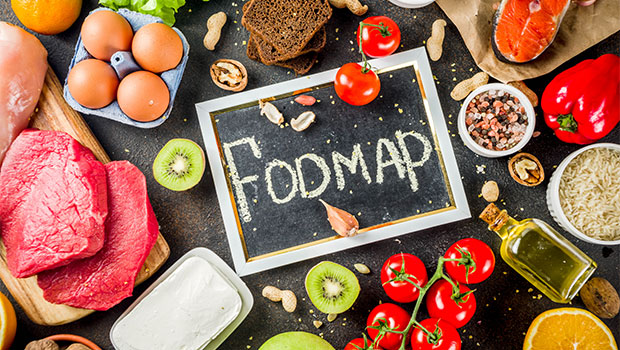With irritable bowel syndrome affecting approximately 12 million people in the UK, Jane Wolfe finds out how diet and lifestyle changes can significantly help sufferers, and investigates the low-FODMAP solution
According to The IBS Network, irritable bowel syndrome (IBS) affects between 10-20% of the UK population (around 12 million people), with direct NHS costs estimated at up to £200 million per year and businesses likely losing approximately £3 billion annually through sick days related to gut problems.
Registered dietitian and medical dietetic adviser to The IBS Network, Gillian Goddard, sees the condition as one of the most common functional gut disorders. According to research (Corsetti and Whorwell 2017), IBS accounts for 50% of consultations with gastroenterologists, and to manage the volume of patients requiring treatment, group education sessions are being established in many NHS areas.
Living with IBS
The symptoms of IBS differ for each individual – the most commonly attributed problems are abdominal pain, bloating, constipation and diarrhoea, but problems can manifest in ways that may not be immediately identifiable as being caused by the condition.
Health journalist Alex Gazzola – who co-authored IBS: Dietary Advice to Calm Your Gut with gastro dietitian Julie Thompson – says that almost anything bowel-related can be a symptom of IBS, but that symptoms also frequently move beyond the gut, and include issues such as anxiety, depression, lethargy and backache.
“IBS can be a very debilitating condition, affecting the quality of life of most people who live with it,” explains Goddard. “Due to unpredictable bowel habits, people find it difficult to leave the house and may have to get up hours earlier for work. The impact the condition has – not only on the person with IBS, but also on family members – can be huge. The function of the family unit, and relationships with partners and friends can be affected, leaving the person feeling socially isolated.”
Goddard stresses that it is essential to get a diagnosis of IBS before starting to treat the condition, adding that often people don’t receive a specific diagnosis, and are simply told that their condition ‘sounds like IBS’.
“Patients can be made to feel foolish if they’re told it’s ‘just IBS’,” Gazzola explains. “As if they just have to get on with their lives and put up with the symptoms, without bothering their doctor – and that can risk missing something more serious. Most people are tested fully before diagnosis, and this should include coeliac disease, inflammatory bowel disease (IBD) and cancers of the digestive tract – this can be done with a few simple blood and/or stool tests. If anyone has any changes to their usual symptoms of IBS this should be discussed with their doctor.”
Describing the factors behind IBS, which incidentally is more prevalent in women, Goddard cites a number of possible causes, including food intolerance, post-infection and visceral hypersensitivity. “A person with IBS is more sensitive to internal stimulus, for example excessive wind and bloating, instigated by eating a particular food or food group. The food type due to the indigestibility may cause symptoms in all people, even those without IBS, but for someone with IBS the pain is heightened due to the sensitivity of the gut.”
And as with many conditions, stress can play a major role – but unfortunately anxiety can also be exacerbated by IBS. “Stressful situations, relationships, work, family, bereavement and financial situations can contribute to increasing IBS symptoms,” says Goddard. “In reverse, it may be the symptoms which cause stress, leading people to become anxious and depressed because of their IBS and how it affects their life.”
“The impact the condition has – not only on the person with IBS, but also on family members – can be huge. The function of the family unit, and relationships with partners and friends can be affected, leaving the person feeling socially isolated”
Food focus
So, when looking at how to ease symptoms of IBS, how big an element is diet? “There is evidence stating the diet may help up to 75% of people with IBS to manage their symptoms,” says Goddard. “Therefore 25% may require other forms of input such as further medical investigations or psychological support to manage their symptoms.”
One potentially helpful dietary route is the low-FODMAP diet developed by researchers at Monash University, Australia, while investigating whether restricting the intake of short-chain carbohydrates could improve symptom control in those with IBS. “We developed the FODMAP diet therapy for treating the gastrointestinal symptoms associated with IBS,” says Dr Jean Muir, Associate Professor (Research), Gastroenterology, at the university. “We invented the term FODMAP over 14 years ago, and now there is a very strong scientific evidence base to support the use of this diet.”
“FODMAP is an acronym of the sugars and starches in food that cause symptoms,” explains Gazzola. “These carbohydrates are fermentable oligosaccharides [fructans and galactooligo-saccharides (GOS)], disaccharides [lactose], monosaccharides [fructose] and polyols [sorbitol and mannitol]. They are widespread in the diet and don’t get absorbed in the body. They then draw fluid from the body into the gut. When they reach the large bowel, FODMAPs feed the microbes that reside there, and the resulting natural fermentation process causes symptoms.”
FODMAP foods
So what high-FODMAP foods do we come across in our daily diet? Some common examples include fruit and veg – examples being garlic, onions, asparagus, cabbage, broccoli, mushrooms, cauliflower, sweetcorn apples, pears, watermelon, plums, blackberries and mango – wheat, rye, pulses, legumes, milk, yogurt, soft cheese and some artificial sweeteners.
There are three stages to the low-FODMAP diet: the first step involves the restriction of high-FODMAP foods for between two to six weeks; then food groups are gradually reintroduced, usually one FODMAP at a time, and one food at a time for about eight to 12 weeks, slowly increasing serving size; then the final step is personalization – once trigger foods/food groups have been identified, each individual patient learns how much of these foods they can tolerate.
One range of foods that is naturally low-FODMAP is Bellygoodness’ ready-made vegan sauces, the brainchild of Gail Robertson and her daughter Francesca who own an allergy and intolerance clinic. “After many years of food testing people with digestive issues we found some common core ingredients were often causing problems,” explains Robertson. “Even ‘healthy nutritious’ foods could cause a gut reaction. Advising people to avoid these ingredients in their everyday cooking made a huge difference to their gut issues.” However, the pair discovered that buying pre-prepared foods that didn’t contain these common gut irritants was not easy. “Francesca started experimenting at home with recipes that avoided these trigger foods and we decided this could not only help our patients but also the wider population who suffer digestive issues.”
“Other free-from ranges generally are free from one or two ingredients per product, whereas we have eliminated everything in one go,” adds Robertson. “Our Bellygoodness sauces have been developed to be packed with flavour as well as being natural, healthy and nutritious without the use of onions, garlic and tomatoes, yeast and the other common trigger foods, which is our unique selling point.”
Different strokes
Although it can be extremely efficacious, the low-FODMAP diet shouldn’t be the initial go-to solution, says Goddard. “First line dietary advice (NICE guidance) should be carried out prior to moving onto second line dietary advice (low-FODMAP),” she says. “It may be unnecessary to follow the strict diet if first line advice is effective. Unfortunately, in some cases, before trying first line dietary advice people with IBS are advised to go and Google the low-FODMAP diet without professional support.”
Gazzola stresses that although studies show a low-FODMAP diet can be effective in about 50-80% of IBS sufferers, this rate is achieved when people work closely with FODMAP-trained dietitians. “It’s possibly far less effective when individuals go it alone, and when people do so it risks failure, malnutrition and potentially even eating disorders,” he adds. “We need to be careful with that figure, as it’s widely quoted, but people need to understand that the diet is complicated, you need practical and emotional support, and the help of a registered dietitian to interpret symptoms. It is also worth noting that it isn’t a cure for IBS, but when it works people are usually very satisfied with the effects.”
And, like many restrictive diets, low-FODMAP is not easy for everyone to follow. “There is a lot of misinformation when it comes to foods that are suitable for the diet and many online lists of suitable foods are incorrect or out of date – this can cause confusion,” says Gazzola. “Some alternative practitioners do not have a good understanding of gut physiology or suitable foods to consider. This is the reason it is useful to contact a registered dietitian.”
“IBS can be hugely socially restricting – but people need to know that there are many things that can help, such as diet, medication, relaxation techniques, and even specially adapted underwear,” explains Gazzola.
Natural ways of reducing IBS symptoms include peppermint, which can help with spasms and pain, although as Gazzola points out, if there are also reflux symptoms peppermint can make these worse. He also suggests that linseeds, flaxseeds or chia seeds can be useful to reduce constipation and bloating, but they must be taken with a glass of fluid.
Lesser known culprits that may exacerbate the condition are poor posture and constrictions, such as tight clothing, so Gazzola stresses that it’s important to feel relaxed and comfortable and hold yourself well. “Take regular breaks if you work at a computer, and consider yoga or Alexander technique if you feel your posture needs work. Just five minutes of light exercise or movement every hour can make a world of difference.”
There’s an app for that!
For those looking for some portable guidance on their low-FODMAP journey, there are a number of digital aids available, including the Monash University FODMAP Diet app. “Over the years, we have built the largest database in the world for foods that have been tested for their FODMAP content,” says the university’s Dr Jean Muir. “As the list of foods tested kept growing and growing, we needed a way to get this information out to the people who needed it, and also be able to keep this list up-to-date. Our smartphone app was launched in December 2012. We now share our FODMAP knowledge with the general public and health professionals in over 130 countries.”
The app contains features including: a food guide section listing hundreds of foods using a traffic light system to indicate if the food is low, moderate or high in FODMAPs; serving size information, as there is often a small ‘safe’ serve of some high-FODMAP foods; tutorials on the three-step diet programme; over 70 recipes; lists of certified low-FODMAP products; a symptom diary and filter to help personalize food lists; and a link to the Monash FODMAP-trained dietitian directory.
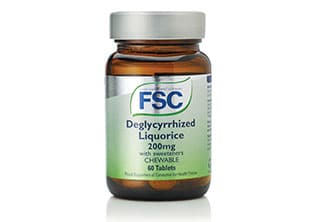 FSC Deglycyrrhized Liquorice
FSC Deglycyrrhized Liquorice
FSC
Tel: 0800 083 0356
E-mail: [email protected]
www.fscsupplements.com
Deglycyrrhized Liquorice is a specially prepared extract where the Glycyrrhizin molecule has been removed. Each tablet contains less than 0.9% Glycyrrhizic acid. In this form, the main active components are the flavonoids which have a demulcent (soothing, coating effect). Chew one to four of the vegan tablets daily, 20 minutes before food. As with all FSC supplements, FSC Deglycyrrhized Liquorice 200mg is made in the UK with the finest ingredients and based on widely recognised scientific evidence of their health qualities.
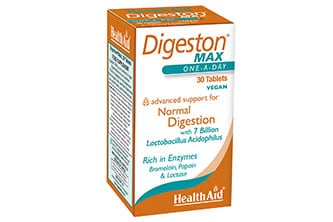 Digeston Max
Digeston Max
HealthAid Ltd
Tel: 020 8426 3400
E-mail: [email protected]
www.HealthAid.co.uk
Digeston® Max – Advanced support for Digestive Well-being! Digeston® Max is a unique blend of vegan Digestive Enzymes including Amylase, Protease and Lipase which is required to digest carbohydrates, proteins and fats. Lactase, found in this formula, is a digestive enzyme which is effective in eliminating symptoms of lactose intolerance. Digeston® Max has the added benefit of Papain and Bromelain that are known for their anti-inflammatory, enzymatic and digestive properties. The formula is also fortified with a superior blend of 7 Billion acid-resistant Probiotic Strains of Lactobacillus to help replenish the body’s good bacteria, improve digestion and gut health. Digeston® Max retails at £12.99 for 30 tablets. Contact HealthAid Ltd on 020 8426 3400 for purchase and stockist information or visit www.healthaid.co.uk.
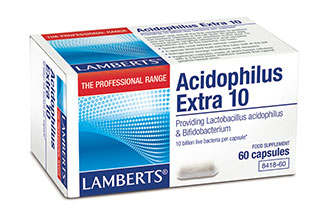 Lamberts® Acidophilus Extra 10X
Lamberts® Acidophilus Extra 10X
Lamberts Healthcare Ltd
Tel: 01892 554313
E-mail: [email protected]
www.lambertshealthcare.co.uk
Lamberts® Acidophilus Extra 10 – Providing Lactobacillus acidophilus and Bifidobacterium. 10 billion live bacteria per capsule. Lamberts® was one of the first companies to produce live bacteria capsules in the UK (over 30 years ago) and we’ve developed expertise in this area. To ensure proven targeted release for acid-sensitive ingredients like live bacteria, we have: • Specifically used delayed release capsules. These innovative capsules target release after an extended time period, protecting the live bacteria from degradation in the stomach. • A special desiccant built into the tube wall of the pot. • Refrigerated storage conditions until despatch. • Vegetarian capsules made of plant-based cellulose with a 3 times lower moisture content than typical gelatin-based ones.
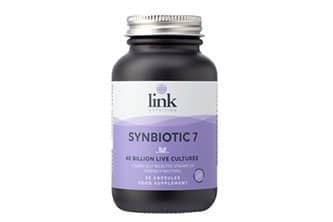 Synbiotic 7
Synbiotic 7
Link Nutrition
Tel: 0207 881 0048
E-mail: [email protected]
www.linknutrition.com
Link Nutrition’s synbiotic 7 contains a unique blend of prebiotics and seven of the most recognised friendly bacteria strains, carefully chosen due to their potential to resist the upper digestive tract and colonise the lower digestive tract. Each gastric-acid resistant capsule provides over 40 billion bacterial units, helping to maintain a healthy community of beneficial bacteria to support your gut microbiome. Synbiotic 7 is gluten and dairy-free and suitable for vegans.
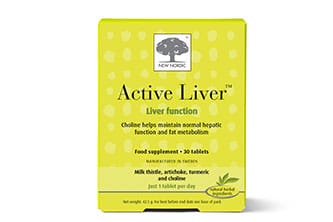 Active Liver
Active Liver
New Nordic Ltd
Tel: 0800 389 1255
E-mail: [email protected]
www.newnordic.co.uk
Active Liver is a natural health product that improves your liver’s health and helps you detox on a daily basis – all year round. With just one tablet a day, it gently but effectively uses known herbal extracts to facilitate detoxing of the body–without the “side effects”. Active Liver™ contains milk thistle, an herb known for protecting the liver and reducing heavy metal toxicity. It also contains turmeric, a superfood and one of the most anti-inflammatory and protective antioxidants known. Finally, Active Liver contains globe artichoke, a plant used for centuries for increasing bile production. Bile is used to bind and flush toxins and fats from the body. Active Liver is available in a 30 and 60 tablet pack – Take one tablet daily.
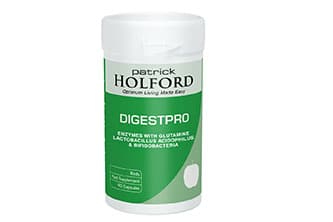 Digestpro
Digestpro
Holford Direct
Tel: 01892 507597
E-mail: [email protected]
www.holfordirect.com
A poorly functioning gut can have an enormous impact on health and wellbeing. DigestPro is an innovative formulation that combines digestive enzymes including protease, lipase and lactase, the amino acid glutamine and probiotics. Digestive enzymes help break down food so that nutrients can be easily absorbed. Glutamine, directly feeds intestinal mucosa, reducing gastro-intestinal permeability. The beneficial bacteria Lactobacillus acidophilus and Bifidobacterium bifidum, help to restore and rebalance intestinal health, break down food and aid with the absorption of nutrients.
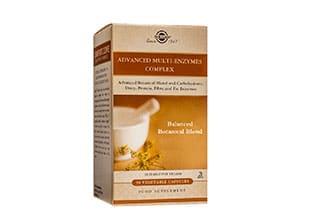 Solgar® Advanced Multi-Enzyme Complex
Solgar® Advanced Multi-Enzyme Complex
The Nature’s Bounty Co.
Tel: +44 (0) 1442 821 419
E-mail: [email protected]
www.solgar.co.uk
Solgar® Advanced Multi-Enzyme Complex is a unique blend of naturally derived enzymes and botanicals to help support your digestive system and the absorption of your food. This vegetarian specialist formula includes amylase, protease SP, lactase, pectinase, lipase, bromelain, cellulose, papain, invertase, maltase and alpha galactosidase. This combination of digestive enzymes support the breakdown of proteins, carbohydrates, starches and fats. Each of these enzymes target different food groups to give a holistic approach to the digestion from food into nutrients. If you feel you need some extra digestive support after meals, using Solgar® Advanced Multi-Enzyme Complex may help.
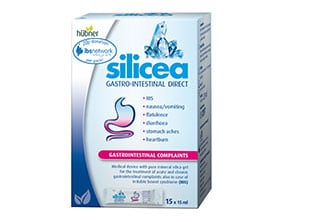 Silicea Gastrointestinal gel
Silicea Gastrointestinal gel
World foods brand management ltd
Tel: 01782 366080
E-mail: [email protected]
www.wfbm.co.uk
Exciting new studies on the original Silicea Gastrointestinal gel has led to the authorised claim for the treatment of IBS symptoms. Importantly, Silicea is produced without the need for preservatives which can be often aggravate digestive problems, and earlier this year Silicea teamed up with the largest IBS charity theibsnetwork.org which offers good advice and support to IBS sufferers. Silicea Gastrointestinal gel is available as a 200ml bottle or presented in easy dose sachets, making them perfect for travelling and ready when you need them.
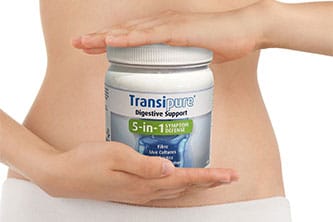 Transipure
Transipure
World foods brand management ltd
Tel: 01782 366080
E-mail: [email protected]
www.wfbm.co.uk
Transipure is a new high fibre powder containing live cultures, prebiotics, digestive enzymes and plant extracts. Our digestive system is one of our most crucial systems for maintaining good health. What we eat and how our body processes food can determine many health factors, including; diabetes, weight gain, heart health, colon & bowel health and a healthy functioning immune system. Transipure contains an array of digestion friendly ingredients to help maintain a healthy digestive system. Transipure is available from your Health Food wholesaler or call World Foods Brand Management on 01782 366080.
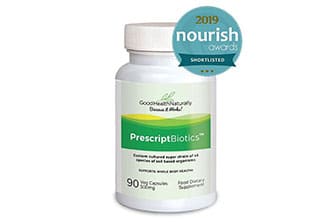 Prescript Biotics™
Prescript Biotics™
Wholesale Health Ltd
Tel: 01606 889 905
E-mail: [email protected]
www.wholesalehealthltd.co.uk
Prescript Biotics™ delivers a unique, “Bio-Identical” SBO Probiotics Consortia™ containing an advanced super-strain of 8x beneficial SBOs (Soil Based Organisms), proven to help renew the gut and create a healthy balance amongst gut bacteria, essential for optimum digestion and stronger immune health. Unlike other probiotic supplements on the market, Prescript Biotics™ is free from dairy, making it 100% vegan and vegetarian-friendly. Ask about our FREE sample sachets for your customers to try before they buy. For more information, please visit call us on 01606 889905 or www.WholesaleHealthLtd.co.uk.
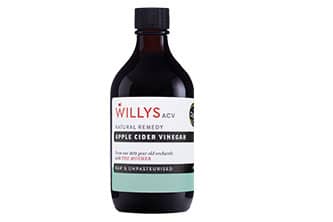 Willy’s Apple Cider Vinegar
Willy’s Apple Cider Vinegar
Willy’s Ltd
Tel: 01432 808090
E-mail: [email protected]
www.willysacv.com
Transformed from a kitchen cupboard essential into the latest lifestyle champion, Apple Cider Vinegar is nothing short of a miracle. Essential for its numerous health benefits, Willy’s ‘ACV is alive with the all-important ‘Mother’, a powerful natural colony of proteins, enzymes and gut-friendly bacteria. The Mother infuses the Apple Cider Vinegar with millions of probiotic cultures which you can see alive and present in every bottle of Willy’s ACV. Known for its well-documented health benefits from boosting the immune system, improving gut health and regulating blood sugars, to treating cosmetic complaints like acne, dry skin and even relieving symptoms of sunburn, the benefits are truly endless.
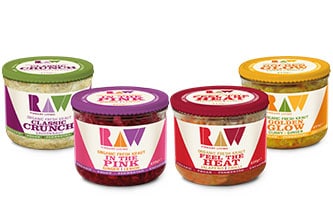 RAW Vibrant Living Organic Sauerkraut Range
RAW Vibrant Living Organic Sauerkraut Range
RAW Vibrant Living
Tel: 0208 547 2775
E-mail: [email protected]
www.rawvibrantliving.co.uk
RAW Vibrant Living Organic Fresh Kraut is made using only the best raw & natural ingredients which have not been pasteurised, therefore retaining all of their gut friendly bacteria and enzymes. We pack our kraut into their individual jars straight away to retain the classic crunch of raw cabbage, and the special ‘breathing’ lids allow the sauerkraut to continue to ferment! The range includes the original Classic Crunch variety, and 3 exciting flavours; In the Pink, a crisp kraut with vibrant citrus and ginger; Golden Glow, a bold and flavourful curry flavoured kraut with zingy ginger and Feel the Heat, a spicy combination of jalapeno and chilli.
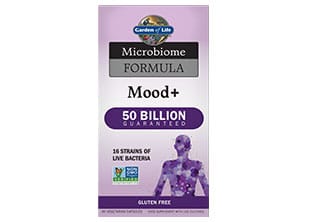 Garden of Life Microbiome Formula Mood+ 50 Billion CFU
Garden of Life Microbiome Formula Mood+ 50 Billion CFU
Kinetic Natural Products Distributor
Tel: 08450 725 825
E-mail: [email protected]
www.kinetic4health.co.uk
Garden of Life Microbiome Formula Mood+ 50 Billion CFU is a unique doctor formulated probiotic formula made with over 70% organic ingredients. Featuring clinically studied strains to support mood, L. helveticus R0052 and B. longum R0175, 350mg of organic ashwagandha and organic Alaskan blueberries for stress management and acacia prebiotic fibre. Non-GMO Project Verified, vegetarian and gluten-free, with a shelf-stable promise – all probiotic cultures are shipped in a “two-shot” desiccant-lined bottle to ensure your microbiome formula Arrive Alive and Stay Alive. All products are also resistant to stomach acid and bile, ensuring proper arrival and activation in the intestines.
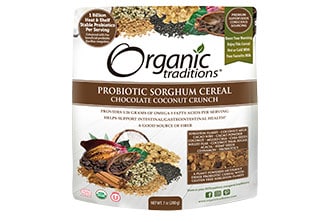 Organic Traditions Probiotic Sorghum Cereal Chocolate Coconut Crunch
Organic Traditions Probiotic Sorghum Cereal Chocolate Coconut Crunch
Kinetic Natural Products Distributor
Tel: 08450 725 825
E-mail: [email protected]
www.kinetic4health.co.uk
Organic Traditions® Probiotic Cereal Chocolate Coconut Crunch is a combination of organic sorghum flakes, chia, cacao nibs, cacao powder, shredded coconut, hemp seeds, cinnamon and beneficial pre and probiotics. Packed with incredible seeds such as chia, flax and hemp, processed by a proprietary milling process that finely slices the chia and flax seeds without crushing them or forcing them through a mesh or sieve to minimise oxidation and degradation of nutrients. Provides 1.28g of omega 3s per serving and is a good source of fibre. With probiotic strain bacillus coagulans, which has excellent survivability and stability, safety and efficacy, and prebiotic acacia gum to create a synbiotic superfood formula.
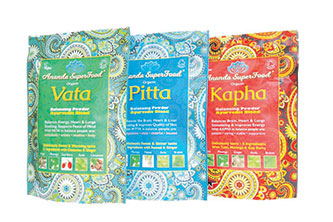 UK First Organic Ayurvedic SuperFood Powders & Nutritional Bars
UK First Organic Ayurvedic SuperFood Powders & Nutritional Bars
Living Ayurveda Product
Tel: 07725 849829
E-mail: [email protected]
www. AnandaSuperFoods.co.uk
Vegan Vata, Pitta & Kapha SuperFood powders, retail at £22.99 per pouch for one months supply. Vata with almond & cinnamon – Relaxing & improves sleep. Pitta with Fennel & Coconut – Digestive aid & good for skin conditions. Kapha with Apricot & Ginger – Immune booster. Available in many independent health food shops.
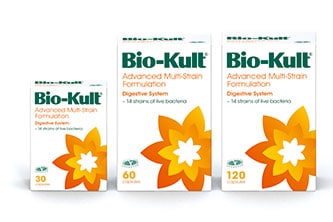 Bio-Kult
Bio-Kult
Tel: 01460 243230
E-mail: [email protected]
www.bio-kult.com
A major factor in digestive health is the approximately 100 trillion micro-organisms (most of them bacteria, but also viruses, fungi, and protozoa) which reside in the human gastrointestinal tract. In fact, the microbiome (which weighs more than the brain) may now be thought of as a virtual organ of the body. Each of us will have a completely different mix of these microbes – like our gut fingerprint. Dysbiosis (either a qualitative or quantitative change in the gut microbial community) is commonly observed in many gut related conditions. There is a strong association between reduced diversity and health issues, which indicates that a species-rich gut ecosystem is more robust against environmental influences. Microbial diversity is therefore generally seen as a good indicator of a “healthy gut.”
One way to encourage microbial diversity within the gut is by eating a diet high in prebiotic fibres and polyphenols to encourage growth of a variety of beneficial species. In particular, researchers have found that those individuals who eat a wide variety of plant foods (over 30 different types a week), have significantly greater microbial diversity and lower antibiotic-resistant species. This was regardless of other dietary factors.
Live bacteria supplements and traditionally fermented foods are a further way to support digestive health. Their mechanisms of action are wide-ranging, but essentially they act to modify the gut microbiota, increasing levels of beneficial species, thereby helping us to digest our food and synthesise nutrients such as B vitamins, vitamin K and short-chain fatty acids; strengthening the gut epithelial barrier; inhibiting pathogens and interacting with the immune system (70% of which is located in the gut). Live bacteria have been shown in numerous clinical trials to be of benefit in a number of digestive conditions. For example, earlier this year the largest-ever clinical trial of live bacteria supplements in IBS ever conducted, found that that active (containing 14 different strains) significantly improved overall symptom severity and quality of life in moderate-to-severe IBS-diarrhoea patients. References are available on request.


